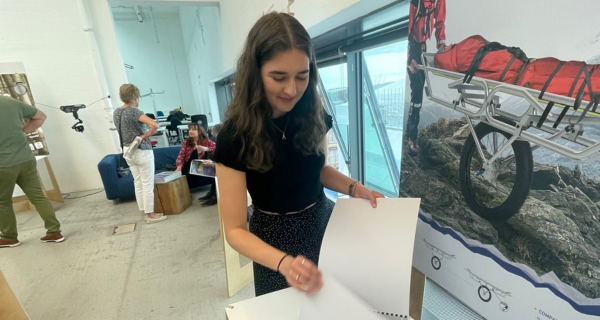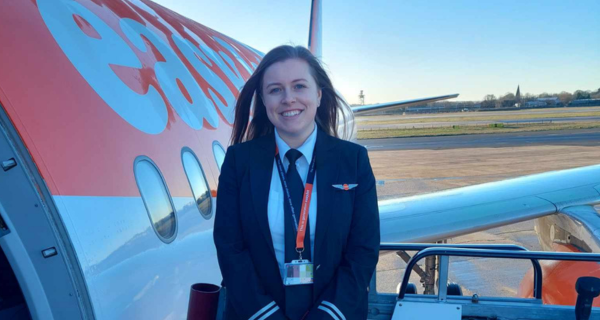Former Pupil Katie Hancock was creating designs in her head long before she stepped into her current design role at global brand, Dyson. We caught up with Katie to find out more about her journey into the world of Product Design Engineering. She shared her top tips for students interested in this field, and talked passionately about our wonderful teachers, and the influence of the comprehensive STEM programme at The Mary Erskine School…
After leaving school, you went to Glasgow University and Glasgow School of Art, achieving a First Class Honours in MEng Product Design Engineering. How did you first become interested in product design?
I first became interested in product design purely through my Design and Manufacture classes with Mr Bowen and Mr Strachan. I loved spending lessons more practically and designing everyday items to be more user friendly or efficient. This led me to develop a passion for creating functional and aesthetically pleasing products, which I’ve been doing ever since!
You were selected by Dyson to be one of their Graduate Product Design Engineers. How did that opportunity come about?
Dyson was definitely a company that was always on my radar, so I applied there for a summer internship after my third year at university. After a couple of interviews and design challenges, I found out that I had landed a position in the ‘Haircare’ team which was really exciting to me as the Dyson Airwrap was being talked about everywhere at the time. I ended up doing two summer internships with the company before returning for my graduate role.
I think being at a global company like Dyson will definitely have a big impact on my career. As an intern or graduate at Dyson, you are put on live projects from day one and are often responsible for key elements of the project, which is super valuable. Being exposed to challenging projects and new technologies so early on in my career really enabled me to develop a broad skill set and refine my modelling and problem solving skills quickly! It can be quite a steep learning curve, but being surrounded by such creative minds and contributing to innovative projects every day keeps it really exciting!
Your skills in product design were recognised while you were still at school when you were selected as an Arkwright Scholar. What did this opportunity give to you, and what would you say to students who are applying for an Arkwright Scholarship this year?
The Arkwright Scholarship was a great stepping stone for me into the world of engineering. Before receiving the award, I’m not too sure I actually knew what engineering was, I just knew that I liked solving problems and designing fun products. However, through Arkwright I attended some engineering events in Edinburgh and did a week-long work placement with my sponsor, QinetiQ. This really helped me figure out what engineering was and which types of engineering I found the most interesting. It’s such a huge field so I would definitely recommend exposing yourself to different types of engineering so you can see which you do and don’t like, before applying to university.
Even if you aren’t selected for a scholarship, the assessment process was quite in depth, and it was my first experience of an external interview. I found that this process was really helpful for my personal statement, and good practice for preparing for university interviews.
What aspects of your time at MES have been most valuable to you, and why?
The consistent support from our teachers and the opportunities I encountered at MES were super valuable. In particular, I remember the STEM days, which offered a practical glimpse into careers in science, technology, engineering, and maths. These experiences were instrumental in shaping my perspective. While I often heard from female university peers about their experience of STEM fields in school being predominantly male-orientated, my experience at MES was quite different. The exposure to STEM through these dedicated days and the insightful talks from female engineers instilled in me that an engineering career was both an accessible and a viable path for me. Considering that no one in my family was involved in engineering, these encounters provided practical guidance that influenced my career choices significantly.
What advice would you give to students who are thinking about pursuing a career in product design?
Go for it! Product design is such an enjoyable career and it’s super rewarding to see your designs come to life! I would recommend visiting different university/college degree shows, if that’s the path you’re thinking of taking, because some courses definitely weren’t what I expected when I visited them in person. University open days and degree shows are one of the best ways to see if a creative course is a good fit for you, and if their projects align with your interests, as it can be hard to tell that from an online description.
What is one the one piece of advice you wish you had received when you first started studying product design?
Your first idea doesn’t need to be your final design, in fact, it shouldn’t be. Back in school, I used to develop my ideas mostly in my head, meticulously crafting what I thought was the 'perfect' design, and then put it on paper as the final product. However, as I gained more experience in the field, I've come to understand that the path from concept to final design is a journey filled with many twists and turns. I recently learned that James Dyson’s first vacuum went through 5127 iterations before he got to the final working design as we know it.
My advice would be not to get too attached to your initial concept. Embrace the process of development, be open to feedback, and never shy away from making changes along the way. It's through this constant evolution that you'll likely arrive at a design that's not just good, but exceptional.
What advice would you give to students who may be unsure about their future career path, but are interested in design or engineering?
Try and gain some experience in the industry by doing some work experience, visiting exhibitions/events, or doing little projects in your own time. It’s perfectly normal to be unsure about your career path, especially while you’re still at school, but staying curious and being proactive in seeking experiences will help you identify your strengths and preferences. Many people I work with started off in a completely different field, so there’s plenty of time to explore your interests and find a field that suits you.
We are so proud of Katie and we know that she is going to go on to do incredible things. Watch this space...






